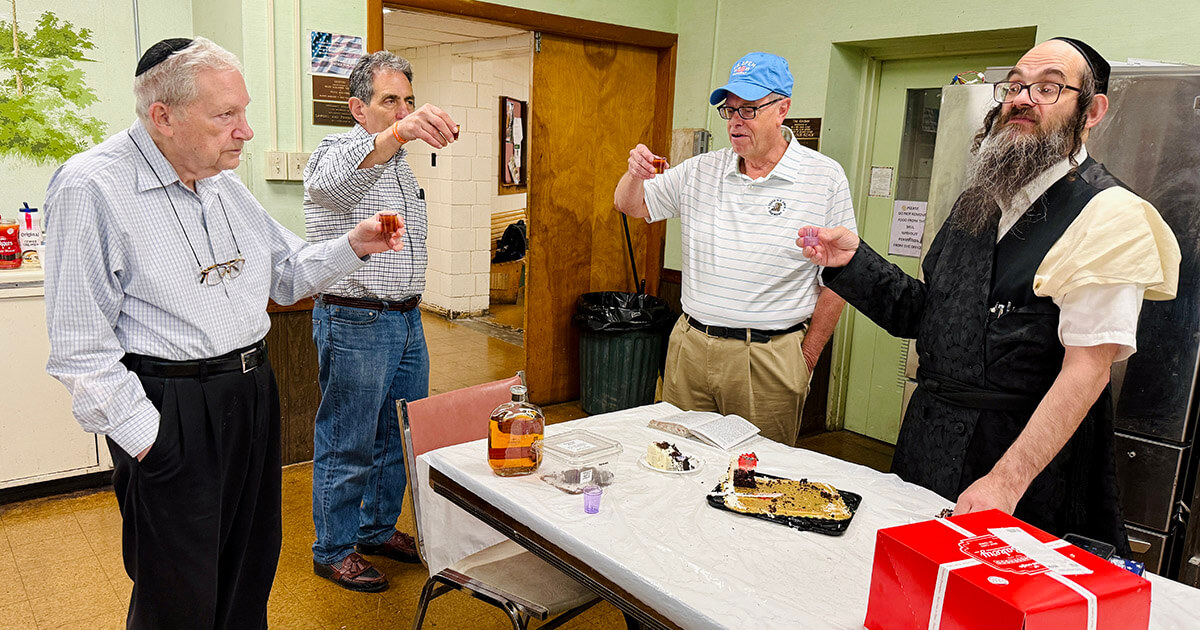This town lost most of its Jews. But not its Judaism.
A century-old Orthodox synagogue in a Rust Belt town lost most of its congregation, its rabbis, and almost everything else — but not its daily minyan

Alan Iszauk at the bimah where he was bar mitzvahed, married, and still prays. The sanctuary’s blue stained-glass windows cast an ethereal glow onto the room. Photo by Benyamin Cohen
This is the second story in our Holy Ground series about congregations at crossroads.
WHITE OAK, PENNSYLVANIA — Every Friday morning, Alan Iszauk returns to the building where he became a man. Sixty years ago this month, he stood on the bimah at Gemilas Chesed for his bar mitzvah and looked out at a packed sanctuary — the air thick with voices, pride and expectation.
Today, the sanctuary is quiet, the voices few. But the minyan, somehow, still gathers.
Downstairs, the daily chapel shows its age. A bucket catches water from the ceiling. The paint peels. And yet, the room vibrates with something else too: the hum of persistence. As steady, as defiant, as that leak.
This morning, 14 men gather. They rise, they bow, they sway. When the final kaddish is said, some step into the basement social hall.
There, as has been tradition for over a century, they pour a shot of liquor — a ritual that once followed the night shift at the now-shuttered steel mills: prayer, whiskey, bed. Today’s bottle is Jefferson’s Reserve Single Barrel. During Prohibition, it was homemade moonshine.
“L’chaim,” Alan says, lifting his tiny plastic cup.
Raised here, rooted here
Gemilas Chesed was born in 1886, the child of Austro-Hungarian immigrants who built the synagogue with calloused hands and resolute hope, in a town where smoke from the mills mingled with the prayers of steelworkers.
Once, this town brimmed with Jewish life. Four synagogues. A community center. Two Jewish-owned bowling alleys. Kosher butchers and several Jewish-owned grocery stores. At Itzkowitz’s corner shop, kids bought pickles for a penny.
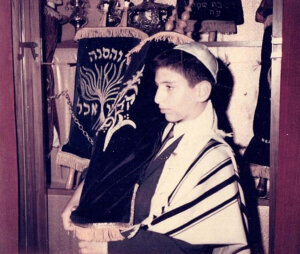
Even the Purim carnivals were stocked from the same place: Tube City Novelty, owned by the Siegel family.
The town had Jewish cops. Jewish firemen. Even a Jewish postmaster. In 1919, McKeesport had the second-largest Jewish population in Western Pennsylvania, after Pittsburgh. At its peak in the late 1930s, McKeesport had roughly 6,850 Jews — more than 12% of the town. It boasted the only daily minyan for miles.
Even in a place with so much Jewish activity, some moments stood apart — events that made the community feel not just rooted here, but recognized.
Oct. 13, 1962. Shabbat. The first day of Sukkot. And President John F. Kennedy came to town.
Rabbi Irvin Chinn — who led Gemilas Chesed from 1958 until his death in 2008 — stopped services that morning. He led his congregants — men in fedoras, women in white gloves — out of the sanctuary and down the hill.
Alan was 10 at the time and remembers joining 25,000 others in a packed parking lot. Teenagers clung to tree limbs. Secret Service scanned from rooftops. For a few electric minutes, history didn’t just come to McKeesport — McKeesport walked out to greet it in its Shabbat best.
A year later, McKeesport raised money for a statue to honor the visit. Gemilas Chesed gave one of the largest donations. The statue still stands — nine feet tall, bronze hand outstretched, like a silent benediction over the congregation that came to greet him.
“So much of who and what I am was shaped and defined at Gemilas,” Alan said, standing in front of the statue, his loafers planted on cracked pavement. “How can you ignore that?”
The ones who stayed
But if 1962 was a civic high point, it was also a turning point.
At the time of Kennedy’s visit, McKeesport had 52,000 residents. Today, it has fewer than 18,000.
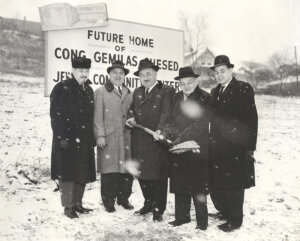
The mills began to close. The Monongahela River stopped carrying prosperity and started carrying families away. The Rust Belt town became better known for its vacancies than its vitality.
And in 1963, Gemilas Chesed tried to outrun the decline by moving to White Oak — a suburb on McKeesport’s border. The new building was sprawling: A sanctuary that could seat hundreds. Two social halls. A dozen classrooms.
At the time of Alan’s bar mitzvah, in July 1965, his father was the synagogue’s president. His grandfather, a plumber, maintained the mikvah for decades.
In the cavernous sanctuary, high ceilings and quartz-spackled cement walls lift the echo of even the slightest sound. The ark stands sentinel. The haunting blue stained-glass windows glow like ghosts and cast an otherworldly light across the space.
On Rosh Hashanah in 1979, Alan first saw Debbie here, across the divider separating men from women. Less than a year later, they were married in the same room.
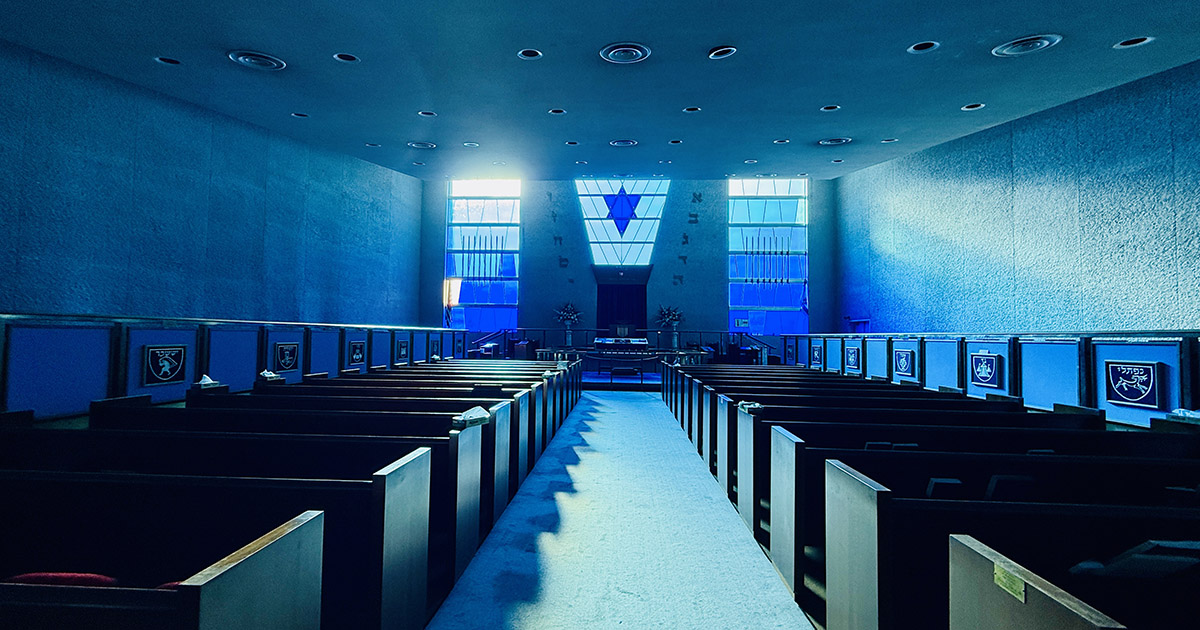
By 1986, at the congregation’s 100th anniversary, there were 290 families who belonged. A year later, National Tube Works — the town’s economic engine, which for more than a century forged steel pipes for America’s oil and gas veins — shut down, the end of a long unraveling. Today, Alan estimates there are fewer than 70 Jews in McKeesport and White Oak combined.
Even as the town emptied out, Alan and Debbie stayed. While the congregation shrank, their family grew. They raised their daughter, Jenna, on the rhythms of Gemilas Chesed: Sunday school, Hebrew school, Sunkist fruit gems from Izzy “the candy man” Joshowitz, and summers at Emma Kaufmann Camp across the border in West Virginia. She joined BBYO in high school; in college, it was Hillel.
Jenna never joined the daily minyan — that was her father’s world. But the faith she inherited was no less fervent.
Now 37 and living in Cleveland, she is active in her synagogue’s sisterhood and still hosts Shabbat dinners. “What I learned at Gemilas Chesed,” Jenna said, “is what I hope to pass on to my own kids. We want to carry that tradition over.”
One mile, two fates
In 2022, with attendance dwindling and daily minyans in jeopardy, Gemilas Chesed tried something radical: $100,000 for any Jewish family willing to move to White Oak and join the congregation.
Three families came — two from New York, one from Israel. The minyan stabilized. The program is now on pause, but its echo is heard every morning in the sound of men praying.
Bruce Gelman, who grew up in White Oak, is now an attorney in Pittsburgh. But he still drives a half-hour to Gemilas Chesed every weekday morning to join the minyan.
His connection to the shul began in grief — the day his father died in 1968, the day of his sister’s confirmation. That Saturday, Rabbi Chinn walked two miles to their house to be with them.
“He’s probably the greatest person I’ve ever known in my life,” Bruce said. As for keeping the minyan going: “It’s a legacy. Our shul was started in 1886. If we’re able to keep it going, we are. And it would be a shame if all Judaism in White Oak was extinguished.”
White Oak still has a mikvah — tucked into the garage of Chinn’s old home — and a functioning eruv, the nearly invisible thread that allows Orthodox Jews to carry on Shabbat. It’s mapped, maintained, watched over.
At Elrod Cemetery, where the dead from four McKeesport synagogues lie buried, Alan walks among family and friends — people whose bodies he helped prepare for burial as part of the chevra kadisha. The sacred society’s work is done in silence, guided by centuries of Jewish law and a reverence for the dignity of the dead.
“I have washed a lot of these men,” he said plainly — as if describing how to make a bed, not prepare someone for eternity. But what he’s done is ancient. A final act of loving kindness — known in Hebrew, appropriately, as a gemilas chesed.
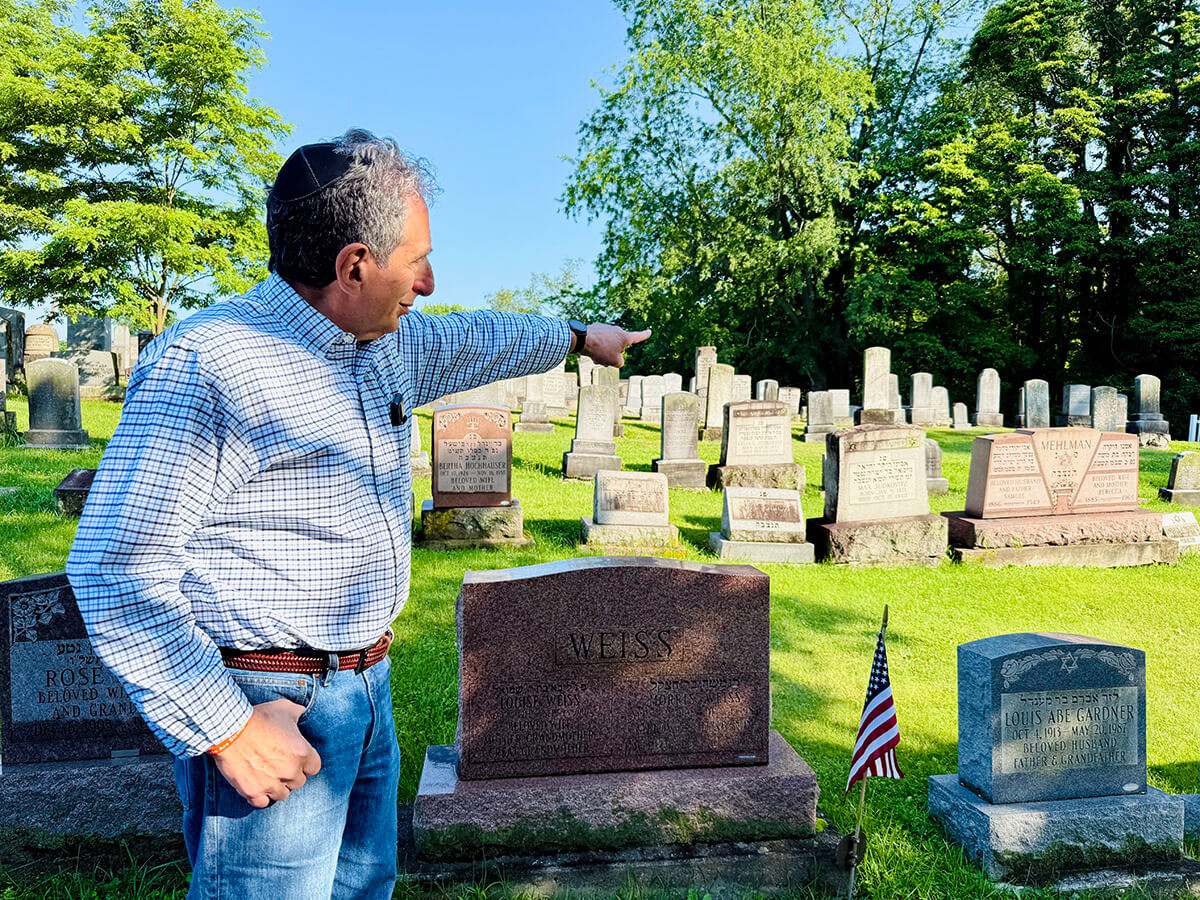
Stubborn insistence
One of Alan’s oldest friends is Bruce Ungar, who runs Mars Supply — a third-generation hardware store opened by his grandfather in 1903.
He and Alan met at Gemilas Chesed’s nursery school when they were 4. They still attend Friday minyan together.
“It’s our alma mater,” Bruce says. “Some people give money to their alma mater. Some people give time. Some lend their expertise. We go to minyan.”
He and Alan now serve as “sort of the institutional memory of the place.”
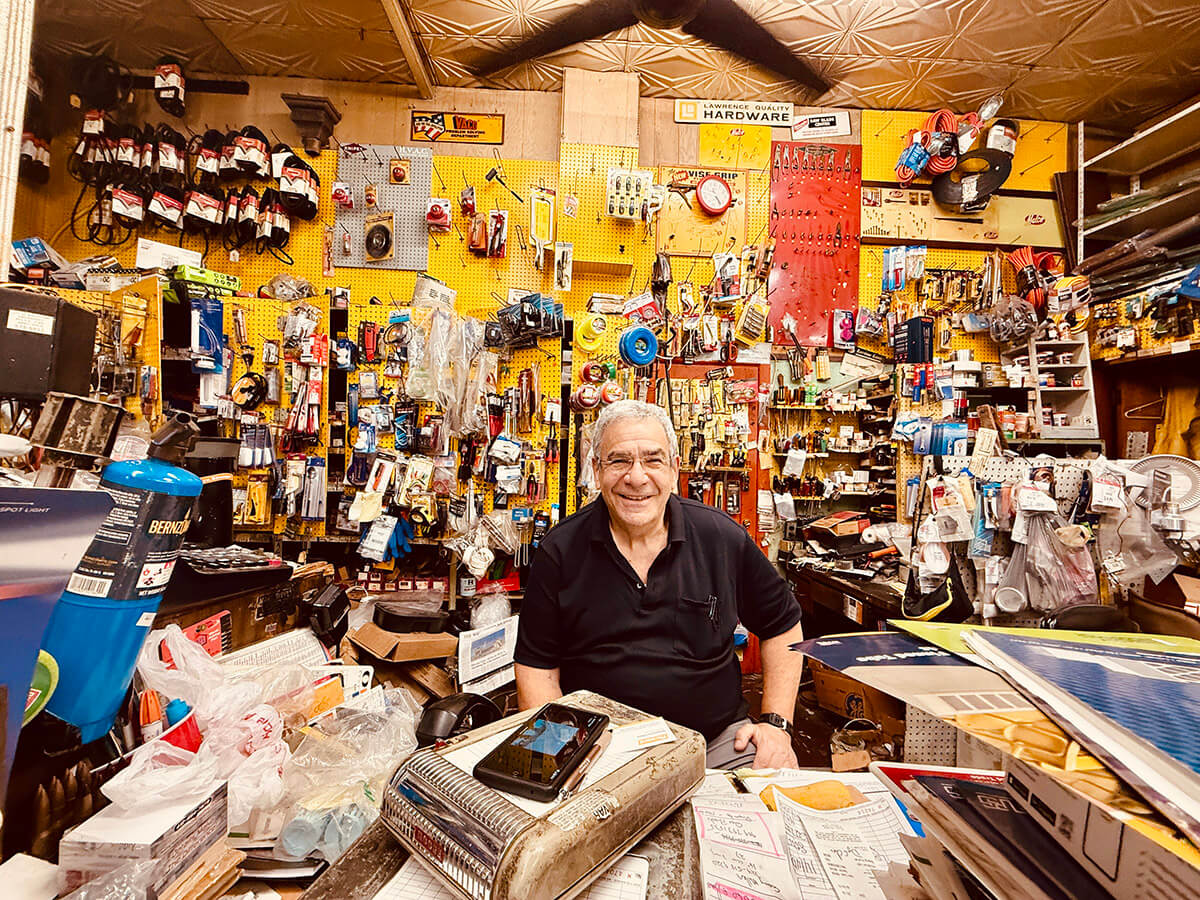
“The fact that everybody still gets together for a little cake and schnapps after services,” Bruce adds, “it’s our heritage.”
He’s also a member of a Facebook group called Growing Up Jewish in McKeesport, where more than 500 members post photos, memories, and updates almost daily. “It’s a way to stay in touch,” he said. “To remember what we had — and what we still have.”
Even now, long after his passing, Chinn’s imprint remains. “I think they’re still functioning on his fumes,” said Rabbi Danny Schiff, who led the Reform congregation just down the road for over a decade.
Schiff’s synagogue, Temple B’nai Israel, closed in May after 113 years. It donated its sacred objects — ark, bimah, a Torah, even its stained-glass windows — to Nik Jakobs, a 40-year-old farmer building a synagogue on a two-acre cornfield in rural Illinois.

But Gemilas Chesed — a mile away — is still here.
Alan is under no illusions. “Any organization that does not plan for its future isn’t likely to have one,” he said. “But that future may include an exit strategy.”
It’s not denial. It’s a refusal to forget. It’s the will to stay.
This is the mill town’s last minyan. But for now, when the final kaddish is said each morning, someone still pours the whiskey.
